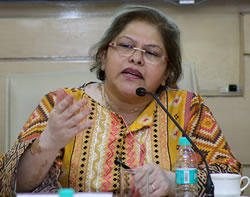 Pakistani politicians and activists have raised fears over the increasing military control of public life after Prime Minister, Shehbaz Sharif gave the Inter-Services Intelligence (ISI) Agency vetting power on Public Service appointments.
Pakistani politicians and activists have raised fears over the increasing military control of public life after Prime Minister, Shehbaz Sharif gave the Inter-Services Intelligence (ISI) Agency vetting power on Public Service appointments.
The move placed the verification and screening of Government officials in charge of postings, appointments and promotions in ISI hands.
Pakistan’s powerful military, which ruled the country directly for three decades, and its premier Intelligence Agency, the ISI, have a long history of meddling in politics and controlling politicians.
It is widely perceived in Pakistan that politicians need the military’s backing to come to power, but many now fear bureaucrats could also need the same support for their appointments and postings.
Senator Mustafa Nawaz Khokhar said the decision would weaken civil bureaucracy and compromise its independence.
“We have shot ourselves in the foot and it’s a decision worth reconsidering,” Senator Khokhar said.
Former Chair of the Senate, Raza Rabbani called Mr Sharif’s decision an attack on the Constitution.
“The concept of civilian supremacy is tarnishing,” Mr Rabbani said.
Author and expert on military affairs in Pakistan, Ayesha Siddiqa said it was depressing that none of the senior leadership of the major political parties had condemned Mr Sharif’s move.
“The Government’s notification has legalised military intelligence’s power over other institutions,” Ms Siddiqa (pictured) said.
“At the same time [it has] sown seeds for a long-term disempowerment of the political class to strengthen its position and that of the Parliament to weaken the military’s control over politics.”
However, Leader of Pakistan Muslim League-Nawaz, Maryam Nawaz, defended the Prime Minister’s decision.
“The ISI works with the Government and it directly works under the Prime Minister,” Ms Nawaz said.
“If the Prime Minister has taken such a step, he knows very well how to assign responsibilities and tasks to which organisation and at what time.”
Islamabad, 14 June 2022











